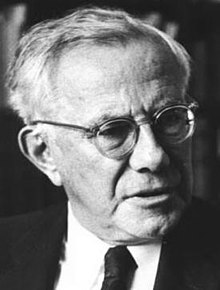
Back بول تيليش Arabic بول تيليش ARZ پل تیلیش AZB Паул Тилих Bulgarian Paul Tillich Czech Paul Tillich Welsh Paul Tillich Danish Paul Tillich German Paul Tillich Esperanto Paul Tillich Spanish
Paul Tillich | |
|---|---|
 | |
| Born | Paul Johannes Tillich August 20, 1886 Starzeddel, Province of Brandenburg, Prussia, German Empire |
| Died | October 22, 1965 (aged 79) Chicago, Illinois, U.S. |
| Nationality |
|
| Education | University of Berlin University of Tübingen University of Halle-Wittenberg University of Breslau |
| Notable work |
|
| Title | Theologian and philosopher |
| Spouses |
|
| Children | 2 |
| Theological work | |
| Language |
|
| Tradition or movement | Christian existentialism |
| Main interests | |
| Notable ideas | |
| Part of a series on |
| Dialectical theology |
|---|
 |
|
|
| Part of a series on |
| Lutheranism |
|---|
 |
Paul Johannes Tillich (/ˈtɪlɪk/;[5] German: [ˈtɪlɪç]; August 20, 1886 – October 22, 1965) was a German-American Christian existentialist philosopher, religious socialist, and Lutheran theologian who was one of the most influential theologians of the twentieth century.[6] Tillich taught at German universities before immigrating to the United States in 1933, where he taught at Union Theological Seminary, Harvard University, and the University of Chicago.
For the general public, Tillich wrote the well-received The Courage to Be (1952) and Dynamics of Faith (1957). His major three-volume Systematic Theology (1951–1963) was for theologians; in many points it was an answer to existentialist critique of Christianity.[7]
Tillich's work attracted scholarship from other influential thinkers like Karl Barth, Reinhold Niebuhr, H. Richard Niebuhr, George Lindbeck, Erich Przywara, James Luther Adams, Avery Cardinal Dulles, Dietrich Bonhoeffer, Sallie McFague, Richard John Neuhaus, David Novak, Thomas Merton, Michael Novak, and Martin Luther King Jr. According to H. Richard Niebuhr, "[t]he reading of Systematic Theology can be a great voyage of discovery into a rich and deep, and inclusive and yet elaborated, vision and understanding of human life in the presence of the mystery of God."[8] John Herman Randall Jr. lauded the Systematic Theology as "beyond doubt the richest, most suggestive, and most challenging philosophical theology our day has produced."[9]
Tillich also authored many works in ethics, the philosophy of history, and comparative religion. His ideas continue to be studied and discussed at international conferences and seminars.
- ^ Paul Tillich, Systematic Theology, Vol. 3, University of Chicago Press, 1963, p. 245
- ^ Paul Tillich, Systematic Theology, Vol. 1, University of Chicago Press, 1951, p. 235
- ^ Paul Tillich, Systematic Theology, Vol. 2, University of Chicago Press, 1957, p. 92, 120
- ^ "Autonomy and heteronomy are rooted in theonomy, and each goes astray when their theonomous unity is broken. Theonomy does not mean the acceptance of a divine law imposed on reason by a highest authority; it means autonomous reason united with its own depth. In a theonomous situation reason actualizes itself in obedience to its structural laws and in the power of its own inexhaustible ground." Tillich, Systematic Theology, Vol. 1, p. 85
- ^ "Tillich". Random House Webster's Unabridged Dictionary.
- ^ Peters, Ted (1995), Braaten, Carl E (ed.), A map of twentieth-century theology: readings from Karl Barth to radical pluralism (review), Fortress Press, backjacket, ISBN 9781451404814, retrieved 1 January 2011,
The current generation of students has heard only the names of Barth, Brunner, Bultmann, Bonhoeffer, Tillich, and the Niebuhrs.
- ^ Tillich, My Search for Absolutes, 245
- ^ H. Richard Niebuhr, Union Seminary Quarterly Review, review on back cover of Systematic Theology, Vol. 3
- ^ John H. Randall Jr., Union Seminary Quarterly Review, review included on back cover of Systematic Theology, Vol. 1